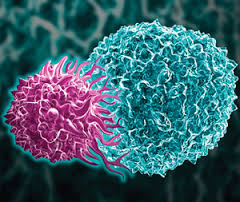Cell therapies to treat cardiac damage have been moving through clinical trials, with mixed results. Often, stem cells are taken from a patient’s bone marrow and infused into the heart. These transplants don’t typically stick around for long and there’s no guarantee patients will see any benefit. Researchers would like to make a “universal” or off-the-shelf intervention developed from donor stem cells that would be ready to go when a patient needs it, engraft in the heart tissue to help it regenerate, and avoid rejection by the immune system.
Lauren Randolph, a bioengineering graduate student at Penn State University, and her team are genetically engineering embryonic stem cells as well as human induced pluripotent stem cells so that they differentiate into cardiac cells but don’t inspire such an onslaught from the immune system when they are transplanted into a person’s damaged heart. She says her hope is that these cells would replace cells lost during a heart attack or heart failure and allow the heart to regenerate.
At the joint meeting of the American Society for Cell Biology (ASCB) and the European Molecular Biology Organization (EMBO) on Wednesday (December 11), Randolph presented preliminary results from in vitro studies of genetically engineered stem cells that evade detection by immune cells.
The Scientist spoke with Randolph about her work….







